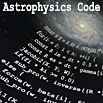Scope and Format:
Owing to their large length scales, most astrophysical objects have very large Reynolds numbers and are indeed observed to be turbulent. Given that laboratory experiments are usually not available and analytical techniques are very limited, numerical simulations become the most valuable tool to study these complicated systems. However, software development is difficult and time consuming. Different research groups around the world have made long term efforts in developing state-of-the-art codes in the past decades. Examples include Arepo, Athena, Charm, Enzo, Flash, Gadget, GadgetMHD, GHOST, HARM, Heracles, MPI-AMRVAC, NDSPMHD, Nirvana, Pencil, Orion, Pluto, Ramses, Snoopy, Stagger, Tarang, and Zeus-MP.
The developments and applications of these numerical codes have been driving important advances in all branches of astrophysics — from the formation of life sustainable earth-like planets in protoplanetary disks to the co-evolution of supermassive black hole and their host galaxies in a cosmological content. However, as these astrophysical codes become more complex, the barrier to entry rises. As a consequence, students and young researchers often use the codes as "black boxes" without deep understanding of the underlying algorithms. This lack of understanding may ultimately lead to confusion in the field and may even slow down progress in astrophysical research. Even worse, applying algorithms to regimes in which they break down can lead to scientifically false results.
By bringing together renowned experts from around the world, the main goals of the NORDITA Astrophysics Code Comparison Workshop are to 1) provide a suit of clear and simple test cases, 2) clarify existing misunderstandings in the literature, 3) compile a rule-of-thumb list useful to astrophysicists, and 4) find ways to improve existing numerical algorithms.
We are planning to focus on hydrodynamic and magnetohydrodynamic turbulence, although actual topics may vary depending on the participants. In order to make this mini-workshop useful, please sign up for the Google Group and the Comparison Wiki. The participants can start discussing a preliminary set of test problems. The workshop (Aug 6–10, 2012) will consist of morning talks/reports, and afternoon discussion/numerical experiments. The program of the workshop is available here.
Scientific Organizing Committee:
|
Local Organizing Committee:
|



